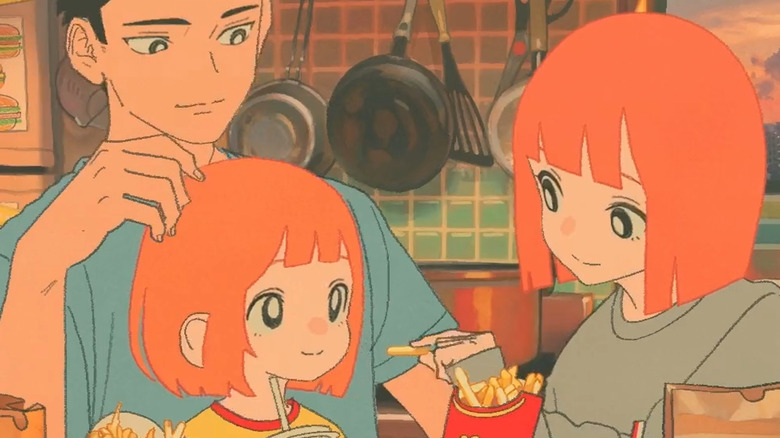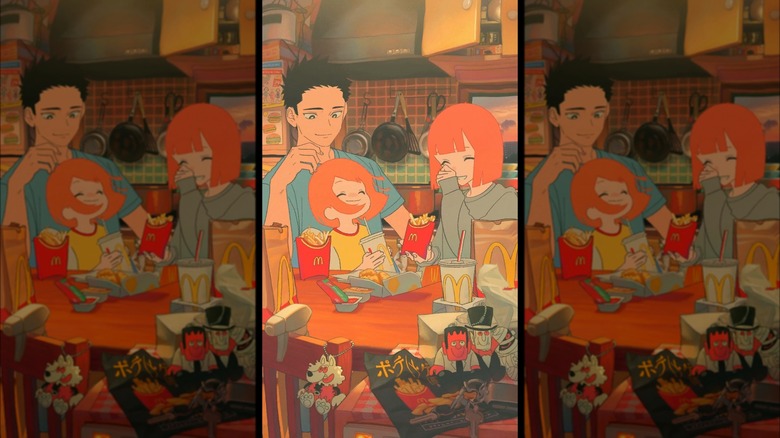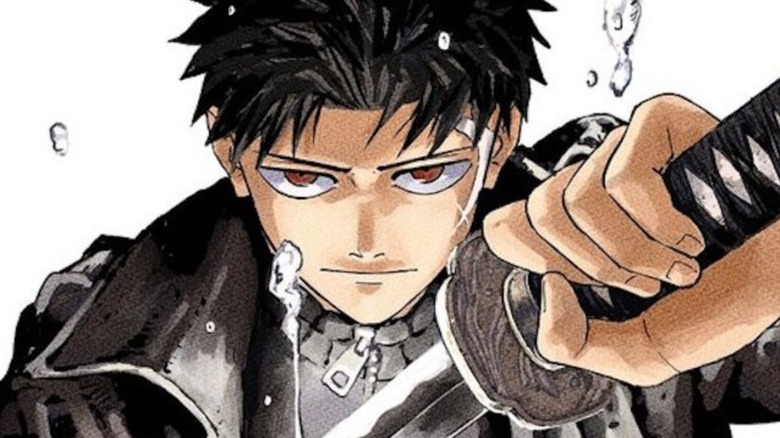Why A Viral Japanese McDonald's Commercial Is Dividing The Internet
Those surfing the web for the past couple of weeks may have stumbled across a certain viral GIF of an animated family of three sharing a meal together at the dinner table. Many viewers of the GIF have been taken with its colorful anime styling, its cozy, soothing tone, and its ostensible message of celebrating time with family. As it turns out, this bit of animation isn't from the next big slice-of-life anime of 2023, but from a Japanese ad for McDonald's.
Back on September 20, the official Japanese McDonald's X, formerly Twitter, account tweeted the anime video, which quickly proved to be a hit with many users. As of the publishing of this article, the tweet has amassed roughly 137 million views, 640K likes, and 135K retweets.
Many of the reactions to the ad among users have been positive, with @GentThePenguin tweeting: "A happy family enjoying a meal. Adorable." Others have even called for more ads made in this style. "We need more of these cute animated commercials worldwide!" @wowMatey wrote. However, not every reaction to the ad has been as wholesome as some might expect. In fact, the spot has actually stirred up quite a bit of controversy for some surprising reasons.
The McDonald's ad is sparking some discourse
A major part of the controversy surrounding the viral Japanese McDonald's ad stems from the political divide. Numerous right-leaning or conservative users have accused left-leaning users of getting outraged over the ad due to it depicting what is ostensibly a traditional, nuclear family dynamic. Other users have strongly disagreed with this assessment and characterized it as a straw man fallacy, arguing that any left-leaning users who are frustrated with the ad constitute an overwhelmingly small minority. "These people are fighting made up wars," @JUNlPER tweeted in response to one such right-leaning claim.
Tangentially, the ad also sparked some reflection on a perceived cultural divide in modern marketing and commercials in 2023. Some users opined that the Japanese McDonald's commercial holds a quality of authenticity that is not commonly glimpsed in modern Western advertising. "It does have a certain wholesomeness to it, which makes it almost entirely unique in the empty and soulless and parasitic world of advertising, corporations..," @AshaLogos tweeted. Other users shared similar observations, with @WGthink writing: "The reason this ad blew up is because it's alien to us, for the West is no longer capable of producing basic messaging that speaks to the core of being human."
Users think the ad has an amusing connection to a popular manga
On a far lighter note, the Japanese McDonald's anime ad also generated some buzz among users for a very different reason. As several accounts noted, the man in the ad bears an uncanny resemblance to Chihiro Rokuhira, the protagonist of the new shōnen manga "Kagurabachi," which coincidentally debuted just one day prior to the posting of the ad. As can be glimpsed in a side-by-side comparison courtesy of @bookofsolace, both characters sport a number of similar facial features, as well as the same spiky black hair.
Despite only being a couple of weeks old, "Kagurabachi" has already been the subject of many ironic internet jokes and memes. Many of these jokes center around the idea that the manga has reached a feverish level of fandom and popularity despite only a handful of chapters having been released thus far. As such, it's no surprise that the perceived link between the manga and the McDonald's ad has added even more fuel to the meme craze.
Among the most popular of the memes is one posted by @Wafflemaker221, which has already amassed over 1.3 million views and 33.3 likes. The tweet features a heavily edited image of Chihiro, in which the magical sword he usually wields in the manga has been replaced with a large serving of McDonald's french fries. As a cherry on top, the McDonald's man's two family members also appear as modified versions of Chihiro, similarly wielding fries and a drink. It seems that, in the end, the now-infamous Japanese McDonald's ad has birthed both controversy and comedy.


